The Influence of J.R.R. Tolkien on Modern Video Gaming
It’s hard to imagine a world without high fantasy, RPG (role-playing) video games. Indeed, the genre constitutes a significant niche market in the United States, and a significant chunk of all video game sales in Japan. But, were it not for the literary experiments of one man, we may never have seen the likes of Legend of Zelda, King’s Quest, or even Final Fantasy, some of the most successful video game franchises in the history of the medium. Strange as it may sound, the landscape of modern gaming makes no sense unless one factors in the influence of the legendarium of that famous Oxford don, J.R.R. Tolkien.
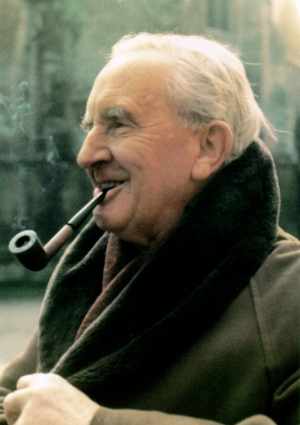
Development of the RPG
Before we begin, we need to provide a working definition of the term “RPG,” and the genre with which it is associated. “RPG” stands for “role-playing game,” and refers to a game in which the player assumes the role of a character within a fictional narrative, undertaking a task or quest alone (as with most video games), or with a group (as with tabletop RPGs and Massive Multiplayer RPGs). Fantasy RPGs have, historically, been the most popular in this genre, beginning with the release of the first tabletop RPGs in the 1970’s. These games attracted a large and devoted fanbase, many of which ended up programming some of the earliest video games. Seeing the potential inherent in the new medium, many of these programmers, logically, began incorporating elements from tabletop RPGs into the emerging medium.
Now, while plenty of games exist based on Tolkien’s work, especially in the wake of Peter Jackson’s Lord of the Rings and Hobbit Trilogies, his influence on the fantasy RPG genre as a whole is not as direct. Adventure for the Atari 2600 was the first game that can be considered a fantasy RPG. Though now considered crude, the programming and gameplay pushed the boundaries of what many considered possible for video games in 1979. It featured dragons, castles, and a quest to save a certain kingdom by finding and returning a chalice to its rightful place. In short, it had all the basics of later fantasy RPGs, providing the template for later action-adventure RPG games. But, groundbreaking as it was, the template didn’t originate solely with its programmer, Warren Robinett. As with most creative breakthroughs, it relied significantly on the discoveries of the past–in this case, the text based adventure game, Colossal Cave Adventure.
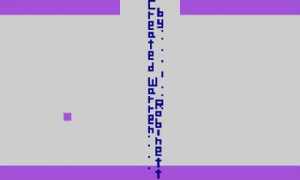
The text-based computer game has all but disappeared since the advent of the video-game and the graphical user interface (GUI) becoming industry standard on home computers. Though lacking graphics, these games provided a scenario for the player, and then the game advanced based upon the simple commands the player entered when faced with options and obstacles. Colossal Cave Adventure, programmed by Will Crowther and Don Woods, was among the earliest, as well as most popular, examples of this genre. Inspired by Crowther’s love of spelunking and a trip to the Mammoth cave system in Kentucky, Don Woods expanded the original adventure Crowther created for his daughters by lifting many fantasy elements from a certain famous tabletop RPG, Dungeons and Dragons.
Gary Gygax and Dave Arneson, who created and published the game in 1974, while not creating a Tolkien rip-off, did liberally incorporate elements from the famous fantasy trilogy, so much so that the Tolkien estate demanded they change “ents” to “treants,” “balrogs” to “baldor demons,” and “hobbits” to “halflings.” By incorporating elements of the tabletop game into the text-based one, Crowther and Woods essentially began codifying what are the essential elements of fantasy RPGs.
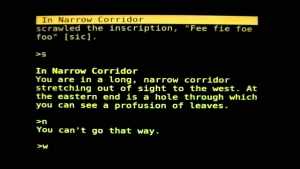
In the late 1970’s, after Atari created the video game market and began pumping out games, Warren Robinett began brainstorming ways in which he could adapt the famous text-based adventure into a game for the Atari 2600. Though the complex text-based had to be stripped down to its barest essentials to accommodate the limited processing space of the Atari, Robinett nevertheless managed to successfully translate the more literary tropes of the genre in the new, more visually-based medium. The success of that game ensured more like it would come after, incorporating the fantasy elements originating with Tolkien.
The Essential Elements
Despite this illustrious lineage, how much Tolkien influences the RPG fantasy genre is not easily quantifiable. After all, these programmers and designers didn’t rely exclusively on Tolkien’s work–the works of other authors, fairy tales, and their own imaginations played a significant role in the development of these games. Moreover, programmers and designers rarely lifted specific story elements from Tolkien’s work. Rather, they imported what might be termed as a “culture” for fantasy games. Elves, trolls, sword-fighting, magic, and dragons have been present in fairytales of most cultures since time immemorial. The tropes, in and of themselves, when used by Tolkien, Crowther, Robinett, or anyone else, are little different from the Grimm’s Fairy Tales or King Arthur. It’s not these concepts themselves, but how they are used.

While these elements are shared with fairytales and other kinds fantasy, there is a sense of age, of weight, reverence even, unique to Tolkien’s world. Much of that sort of solemn tone was imported into these new kinds of games. To take a specific example, let us look at elves in fantasy, before and after Tolkien. Elves are beautiful, wise, immortal figures in Tolkien; in stories prior to his work, elves were more like Christmas elves, tiny “figures of fun,” mischievous and not worth taking seriously. But, though we still have Christmas elves, most elves, or elf-like creatures, in fantasy are much like Tolkien’s: wise, solemn, immortal, superior to humans in almost every way (though the latter is much more nuanced in Tolkien’s work proper). It’s the selection of elements that counts, to be sure, but more so the way in which the elements are used.
To illustrate our case, let us consider a specific example in a popular modern RPGs, World of Warcraft. Within the fantasy realm it creates, one often encounters, as one does in many of these fantasy RPGs, those of the elven race. The superficial similarities are clear–like many fantasy elves, these elves are wise, fair, and immortal–but if we go deeper, we can see more clearly the unmistakable stamp of Tolkien. The Elves in World of Warcraft are divided in different categories, races, if you will: the “Night Elves,” the “High Elves,” the “Blood Elves,” and the “Dark Elves.” These elves, though they share major characteristics, have differing abilities and loyalties depending on their race (each race having a long and sometimes tumultuous background with another). Now, those who only read the Lord of the Rings may not know this division among the Elves began with Tolkien, whose long, glorious, and tragic history he chronicles in the Silmarillion. Even the names given to the races are eerily similar–for instance, “Sin-dorei,” the blood elves, sounding much like Tolkien’s “Sindarin,” and “Quel-dorei” resembling “Quendi” and “Quenya.” Though the backstories of the elvish races vary wildly depending on the source material, nonetheless these and other Tolkienesque elements have floated into the RPG genre since the beginning.
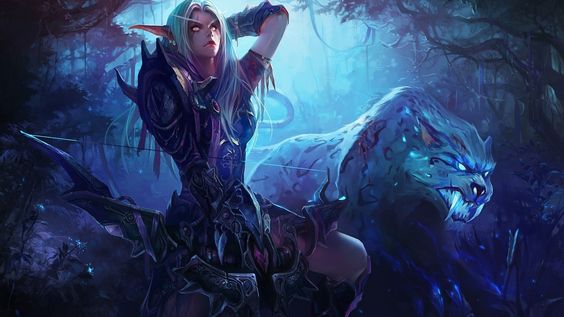
The RPG fantasy genre grew from a sort of “culture”: these games partake of the tropes, mood, and elements of Tolkienesque high fantasy to new ends, characters, and stories. These programmers and designers used tools suggested by Tolkien’s work to create an entirely new genre of video game, expanding the world of video-gaming when sports games and arcade ports ruled the video gaming world, a world where all these elements of fairytales intertwined together with a single history, geography, etc. What these games share with Tolkien, what he unwittingly contributed to the genre of RPG fantasy games, a unified world where all these fairytale elements intertwine with a single, coherent history, geography and culture.
Tolkien’s Continuing Influence
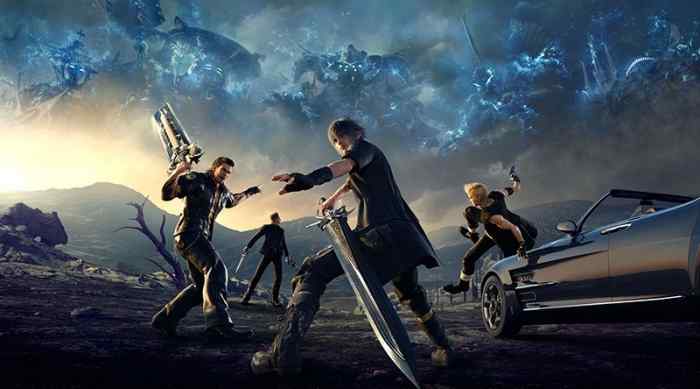
Final Fantasy and The Legend of Zelda are two of the most popular RPG fantasy games in the modern video game market. Though both are distinct in their use of common fantasy tropes, the influence of Tolkien’s work upon each of them is clear the farther back we look, though both lifted different elements and use them uniquely within their respective worlds. Of the two franchises, the first Final Fantasy, released in 1987, has the most obvious parallels to Tolkien’s work, at least as far as their stories are concerned. The first Final Fantasy game has humans, dwarves, orcs, and dragons, while adding mermaids, robots, and other such creatures. Much like the quest of Frodo and the Fellowship to destroy the One Ring, the main storyline of the game involves The Four Light Warriors travelling to vanquish the works of Chaos and the Four Fiends. Tolkien’s influence became much less pronounced as the years rolled by and Final Fantasy developed a mythology unique to itself, but the initial games are undeniably indebted to Lord of the Rings, both in their story and surrounding mythology. While not a carbon copy, the basic outline–a group of heroes travelling to destroy an ancient, entrenched evil–is one popping up frequently in fantasy media after the publication of Tolkien’s trilogy.
Now, while Legend of Zelda doesn’t lift as much direct story elements, it’s tone and scope is reminiscent of what Tolkien sought to accomplish in his legendarium. That is, Tolkien didn’t only write some fun fairytales, he created an entire world with its own comprehensive and developed mythos. Beginning with games Ocarina of Time and A Link to the Past (released 1998 and 1991, respectively), Zelda, unlike many of its predecessors, outlines a creation myth for the land of Hyrule, bringing all the disparate elements of its story together into a cohesive whole. Though Shigeru Miyamoto, the game’s creator, relied on his own childhood experiences as well as well-known stories such as Peter Pan and Arthurian legends, Zelda obviously derives significant elements from Tolkien: three goddesses bestow on the land of Hyrule a powerful piece of magic known as the Triforce, which is subsequently stolen by the evil sorcerer Ganon, by doing so plunges the land into darkness and wickedness, and only an ordinary farm boy with a pure heart of courage can endeavor to retrieve it and save Hyrule.
To those familiar with even the basics of Tolkiens’ mythology, the parallels should be clear. Not a one to one correspondence, to be sure, but its certainly clear from whence the game designers derived these elements. This only becomes clear when the games discuss the history of Hyrule explicitly, and is not necessary to know in order to enjoy the game, but it enriches the game with an epic scope and mythical weight it might not otherwise have.
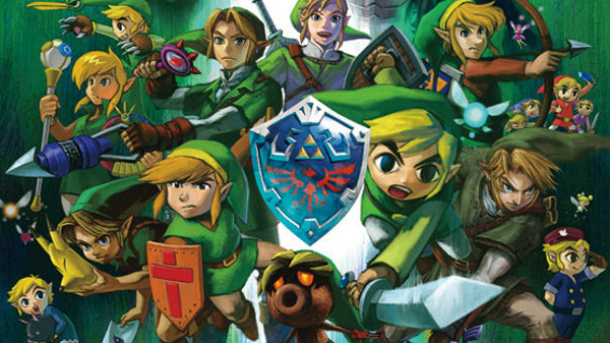
Which is what Tolkien provided for modern video games: a mythos. Before Tolkien, it was not considered necessary for a collection of fairy stories to have a coherent history and backstory tying them together: it would have seemed ridiculous, taking a pleasant diversion entirely too seriously. But Tolkien recognized the storytelling possibilities inherent in having the stories linked together coherently, by a single history, mythos, and geography. While many video games lifted story elements, characters, and creatures from Tolkien, they used them to enrich the newborn medium, to create something creative, exciting, and innovative, rather than simply plagiarizing to vomit out games faster. Tolkien defined most of the fantasy tropes now used in modern gaming, providing a “culture,” a “landscape” upon which all these video game worlds unfold and evolve.
Without Tolkien’s work, many of the tropes and elements we consider essential to fantasy games simply would not exist, or at least not in their present form. Tolkien added a richness, depth, and solemnity to “fairy stories,” as he called them, in an era when fairytales were dismissed as trivial distractions fit only for children. He uncovered possibilities no one had ever considered in fantasy before, and game developers explored those possibilities in new and groundbreaking ways.What matters here is not so much that they relied so heavily on Tolkien’s groundbreaking work, but how they used the tropes originating with Tolkien to enrich and transform the nascent medium of the video game.
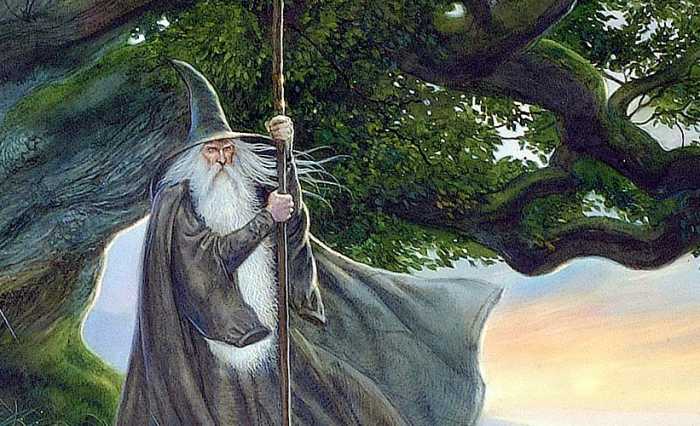
Works Cited
Carol L. Robinson, “Electronic Tolkien: Characterization in Film and Video Games.” From Medieval Afterlives in Contemporary Culture, Ed. by Gail Ashton, Bloomsbury Publishing, 2015.
Douglass C. Perry, “The Influence of Literature and Myth on Video Games,” 18 May, 2016, http://www.ign.com/articles/2006/05/18/the-influence-of-literature-and-myth-in-videogames?page=1, retrieved 9/15/2016
Andrew Heisch, “Tolkien in Videogameland,” 3/18/2011, http://www.nintendojo.com/features/specials/tolkien-in-videogameland, retrieved 9/15/2016
“A History of ‘Adventure,'” rickadams.org, http://rickadams.org/adventure/a_history.html, retrieved 9/15/2016
World of Warcraft Wiki, “Elf,” http://wowwiki.wikia.com/wiki/Elf, retrieved 9/15/2016
What do you think? Leave a comment.











Tolkien would roll over in his grave if he knew that people were profiting off his work through violent video games.
Yes, it’s an interesting metamorphosis.
I don’t think so. I think he would have been as progressive as they come should he have lived until today. He’d probably have more of a say though in what makes it to any adaptation.
He was certainly not ‘as progressive as they come.’ He was a devout Catholic and his political views were… well let’s just say that he would not have chosen democracy for England.
His religious life was quite interesting and you might enjoy reading about it – however, don’t let his politics influence you enjoying his writing.
You should definitely read the Shippey biographies on Tolkien and the Collected Letters of J.R.R. Tolkien. Tolkien was the epitome of the stuffy professor and he hated seeing his copyrights used against his will.
When I wonder what J.R.R. Tolkien would say today, my mind always goes back to his views and the views of his fellow professor/high-fantasy-writer friend C.S. Lewis. They did not see the value of studying modern literature. They wanted the Oxford program in English to focus on literature written before 1400 AD, not after. Lewis expressed their view wonderfully: “the student who wants a tutor’s assistance in reading the works of his contemporary might as well ask for a nurse’s assistance in blowing his own news.” I don’t agree at all with that view, of course. Everything and anything can be taught and written about, including modern literature or Tolkien’s influence on fantasy gaming.
That is absolutely true. Tolkien wrote a letter (which can be found in his published collection of letters) in which he ranted about someone naming their boat after Shadowfax (Gandalf’s horse). Sometimes I wonder if Tolkien is going to come down from heaven to strike me down for naming my dogs Merry and Pippin. I figure my dogs’ names are justified, though, as the majority of my scholarship has been on Tolkien studies.
But seriously, I think of this letter often whenever I see the latest monetary creation based on Tolkien’s works.
Perhaps, but it’d be a shame if he did, childish too. Any artist should know that once they release their work into the world, it’s no longer really theirs. Tolkein was quite staunch in saying the LoTR wasn’t supposed to symbolis anything, he hated allegory in fact. But that’s never going ot stop people from interpretting and repurposing his work in their own way. That’s the beauty of any kind of art, it’s never static. It shifts and changes constantly depending on who’s reading it, and when.
His stories are quite brutal and violent too, I think he’d be very interested to see how the world he created has evolved and grown.
It’s understandable to think Tolkien might be dismayed by the commercialization and violent adaptations of his works, but it’s also worth considering his progressive nature as a storyteller. While he was a devout Catholic with traditional values, he was also a lover of myth and innovation. The essence of his storytelling, epic battles between good and evil, rich world-building, and deep lore, aligns well with modern video games, even if the medium differs. The interactive nature of video games offers a new way for fans to engage with his mythos, keeping his legacy alive and introducing his world to new generations. Moreover, video games, like literature, have evolved into a sophisticated art form, capable of telling complex and meaningful stories. Tolkien’s influence on this medium is a testament to the timelessness and adaptability of his work, enriching the genre and expanding his reach far beyond traditional literature.
My first introduction to The Lord of the Rings was the first Peter Jackson film when it released on VHS (remember those?), but days after, I started reading The Hobbit and the ensuing trilogy. For me, it is the world-building that makes Lord of the Rings one of the greatest works of fiction. You come to truly understand the characters and the place they live in.
On the gaming side, I have played every Lord of the Rings game after their PS2 debut. I still have copies of Battle for Middle-earth and its sequel (man, I wish someone would release them on Steam), as well as copies of the lackluster Fellowship of the Ring and GBA adaptations of the trilogy.
Your journey into Tolkien’s world through both the films and books highlights a key aspect of his influence: world-building. It’s fascinating to see how Tolkien’s detailed universe captivates readers and gamers alike. The immersive experience of The Lord of the Rings games on PS2, especially titles like Battle for Middle-earth, underscores how well his narratives translate into interactive media. These games not only bring Middle-earth to life but also allow fans to engage with the story in a dynamic way, offering a deeper connection to the lore and characters. Despite the varied quality of Tolkien-based games, the enduring appeal of his world is evident. The yearning for a seamless blend of story and gameplay reflects Tolkien’s ability to create timeless narratives. As a fellow fan, it’s great to see how his work continues to inspire and shape the landscape of both literature and gaming.
Incredibly in-depth article. Thanks for this The Artifice. This type of material is why I come here more than any other publication.
Reading this reminds me of a LOTR-themed RTS titled “War in Middle Earth” that I played on the Amiga, back in the day. Sure enough, it looks like it was an official LOTR game, and published by Melbourne House: https://en.wikipedia.org/wiki/War_in_Middle_Earth
I had it for the IBM PC came on 4-5 5.25″ floppies, great game really fun and ground breaking
My buddy and I rented the SNES LOTR game from Blockbuster because it was advertised as 1-4 player on the box. And we played that shitty game all weekend trying to activate co-op to no avail. From what I can tell on Wikipedia, it supposedly did have multiplayer, but do not believe it. They are lying. I also remember the Blockbuster employee having no empathy when we tried to return it. It was a tough time.
It did have multiplayer! But you had to use the multitap – two player without the multitap didn’t work. My dad, my brother and I played that game for a couple weeks straight, making maps along the way (akin to playing the first Zelda). We actually beat it together. I played as Frodo – my dad and brother died and cycled through the remaining stock of characters during the final Balrog fight – there’s a side quest to grab a crystal of some sort for Gandalf to use in that fight, and we thought we’d lost for sure when he turned to dust – but I just kept rhythmically side stepping and stabbing the Balrog with Sting, for what felt like half an hour, and damn if I didn’t kill him that way. Mediocre game, great memories.
You would start the game with 1 player then u would travel to I can’t remember I think to some cave and there you would find a character that got lost in the cave. Then at that time u could play co-op. It would take about 15-20 min before u found him and started 2 players.
Lovely piece. One can say that his effect on the fantasy genre, being the first and largest, determined the whole development of RPGs to such a degree that the scene would be totally different if “The Hobbit”, and especially “The Lord of the Rings”, had never been written.
There is a reason why we have terms like “Tolkien-esque” or “Lovecraftian”. 🙂
Tolkien is the father of modern fantasy, and anyone that has a graceful elf, a raging orc, or a greedy dwarf is paying homage to him. So few people realize that he created all of the things we say are stereotypes now.
Brilliant article. Educational AND enjoyable. Thanks Allie!
I love Tolkien’s works and have enjoyed playing LOTRO over the years (and still am). Battle for Middle Earth II was a favorite of mine. Another great game that I stumbled upon back a while ago was a MUD called Two Towers. Good times.
I have played most of the LoTR franchise, from The Hobbit text adventure, Its 2 spoof games(The Boggit and Bored of the Rings) up to War In The North. Still have a copy of War Of The Ring, both BFME games including Rise of the Witch King. Play a lot of LotRO Tried conquest and hated it. Third age was fun if a little too short Will definitely keep an eye out for Shadows of Mordor. This promises to be great if I want to visit Middle Earth offline.
Golden Axe was my favorite arcade game when I was a kid. I pretended it was Lord of the Rings. It was a little hard pretending those women were evil elves of some kind, but that’s what I did.
You’re a Tolkien scholar!
I’m a very rare breed that is totally oblivious to LotR.
Never read the books, never saw the movies, never played the games.
It is quite comfortable under my rock.
In all fairness it really is not for everyone. I have tried to read the books (only made it through the Hobbit and most of Fellowship years ago, the other two sit largely unread), and I sat through the movies, which were way too long for their own good and plodding in pace at times. Other than the awesome Horn of Gondor scene in Fellowship where Boromir covers Frodo’s escape, the movies were snoozers.
I even tried to sit through the first of the new Hobbit films, but that was a chore. That movie is a real stinker.
I know a lot of people disagree. I debate this with my dad all the time, but he may be waxing nostalgic because he read the novels when he was in college years ago.
Now, more than ever, videogame designers are searching for more original, unlicensed, and mature stories to tell. Many of the most beloved hardcore videogames aren’t based on movies, books or comics. They’re more deeply ingrained than that.
I am sometimes a gamer and have played some of these games. I have to agree with you with most of your statements.
Modern fantasy owes a great deal to Tolkien for re-popularizing fantasy for both children and adults. He not only modeled the elements of RPG such as characters, creature types, plot, and world building, but also themes such as good vs. evil that are apparent especially in early games.
Nice article!
Fascinating, educational, well-written article. I have only a moderate interest in Tolkein, but I really enjoyed it. Thanks!
Battle for Middle-earth is probably my favorite RTS game. I normally HATE hero characters but in that game they were actually fun instead of being just another thing to manage like the awful heroes in Blizzard games. It had a fun campaign and well really done levels.
I think that Professor Tolkien wouldn’t mind people living in and expanding his world as long as it is done well.
As a huge Tolkien fan… thanks!
As a big Tolkien fan that has been playing games since the Apple II and IBM PC I loved this article.
This was an awesome article, perfectly situated at the intersection of two of my passions: Tolkien and gaming. I thoroughly enjoyed reading it. Thanks.
I enjoyed LOTRO for a long time, and really liked War in the North until it became unplayable because of bugs that prevented me from moving forward.
Baldur’s Gate, Everquest, The Elder Scrolls, Neverwinter Nights, World of Warcraft – they’re all ground in Tolkien’s fantasy.
Recently fired up LOTRO again after being gone for a couple years. They are slowly progressing towards Mordor. LOL. The game still has it’s charm.
This is the kind of writing and detail in video game journalism on a scale that pretty much only The Artifice attempts. Well done.
Really liked the Battle for Middle Earth games, hell I even enjoyed the War of The Ring.
Many elements of the most popular games have classic roots and when we play these games we are interacting with worlds that are timeless.
Without Tolkien’s groundbreaking works, there might not even be a fantasy genre – or, at least, it wouldn’t look anything like it does now.
Absolutely incredible piece. Thank you for writing it.
Tolkien based games are poor. There were a lot of passionate fans that wanted to create an awesome Middle Earth experience, and they were ultimately cock-blocked into failure. Why? Because the games need to appeal to everyone and their dog because that maximizes profit. Don’t cater to the fans that will get the most from the game, cater to everyone that could give you money.
It’s clear that J.R.R. Tolkien exerted a huge influence on the development of RPGs, especially in the fantasy genre.
This is a freaking wonderful article. Loved it.
To this day the EA LotR: Two Towers and RotK games are the only officially licensed movie games that I actually loved. I played the hell outta both of those games when I was younger, and some of those levels were crushingly difficult at times. I remember thinking how great the graphics were, and I loved the transitions between the movies and the game footage. Definitely worth playing.
I still remember the epic combos in The Two Towers, and Legolas (though fragile?) was offensively excellent.
Tolkien’s “Lord of the Rings” and Rowling’s “Harry Potter” series epitomize what the videogame industry does so well.
If Tolkien had one of the biggest influences on the fantasy genre, then H. P. Lovecraft was fundamental in laying the foundations for the horror genre. Both are my favorite authors.
I am new to the Artifice and this was first article I clicked on, so I wanted to thank you for the interesting read.
I am taking a Game of Thrones course right now and the first lecture was more or less all about the Tolkien “mythos”. Really anything that could fall into the Fantasy genre owes a pretty great debt to Tolkien not only for a fantasy foundation, but for engaging a varied audience in a fantasy world. I still feel that while LotR has succeeded as a multimedia franchise, some fantasy settings can’t break away from that “nerdy” stigma and so don’t reach quite as widely in the public. I’d be interested to see what sets Tolkien’s world and Nintendo’s apart from some more niche domains in that respect.
Anyway, I really appreciate having a platform for these kinds of articles and yours is a great introduction. Thanks.
People call Tolkien “the father of modern fantasy”, but that doesn’t mean that anything with fantastical elements in it is a Tolkienian fantasy.
I agree. While I won’t deny that Tolkien has a well-deserved influence upon the genre, I can’t help but think about Joseph Campbell’s “Monomyth” and patternicity when I read this. Certainly many of the titles the author lists are direct descendants, but I am not convinced that is the case with all of them. I am somewhat skeptical regarding Legend of Zelda for example.
This trio of LOTR movies revived mass interest in Tolkien and spawned several EA and Vivendi Universal games based on Tolkien’s works.
I think it’s very interesting to see how much video games have evolved in the short span of time they’ve existed. Where will they go next? There’s so much focused on their aesthetics, but in many games, there’s a deep and profound story within them. I think Tolkien would be impressed with the writing of these games, the complexity within them — especially in one of my favorites, Mass Effect. It’s sci-fi, but what is sci-fi but fantasy in the future?
It’s interesting to see how far-reaching Tolkien’s impact is. We have to remember that Tolkien’s work created such a craze back then. Our generation’s equivalent of the Harry Potter series for sure.
I read this article with great interest as my serendipitous introduction to The Artifice. It’s serendipitous because I am teaching right now a course with just a handful of students on Fantasy and Romance. I’ve taught it off and on for about a decade or more as a combination of medieval texts and modern and contemporary fantasy with Tolkien at the center–either The Hobbit or a portion of Lord of the Rings (LotR) plus (always) his “Essay on Fairy Stories” and “Leaf by Niggle”. This semester I decided to incorporate an immersive experience with Lord of the Rings Online (LotRO) as the students read LotR, and had them discuss the experience of exploring a Secondary World via the book vs. the game. Students wrote about its setting, its experience of time, interaction with characters, character development, plot scripting and the matter of limited choice–the fatedness or scripted destiny of characters in each environment. While the students expressed much appreciation of the settings and exploring the history of Middle Earth from the introductory quests of LotRO, they found the book more complex in character development and interaction.
The most wonderful part of the experience for me, though, was the way we discussed the “Essay on Fairy Stories” and “Leaf by Niggle”, because in the context of exploring a computer-mediated game version of Tolkien’s Secondary World, students were more engaged than usual with Tolkien’s concepts of Recovery, Escape, and Consolation–key components of his theory of Fantasy and our need to make and inhabit Secondary Worlds. And discussing “Leaf by Niggle” brought out many parallels between the world development of a game environment and what Niggle and his old neighbor Parish (and by extension others) work on building together at the end of that fascinating and very modern story: Is it a theme park, or could it be an interactive game? It is far more successful than the framed bit of canvas on which Niggle worked alone, and I think we can learn something of what Tolkien meant by building worlds with “the inner consistency of reality” by reading his work in context with the interactive games that immerse us.
It is truly remarkable the impact that Tolkien has had on our understanding in the realm of the fantasy genre. He definitely was the leading pioneer in the genre, and it is interesting to imagine how he would feel about the use of his basic concepts. The depth of the world that he created is definitely inspiring beyond the realm of fantasy, but even into other video game styles.
A little disappointed that the Elder Scrolls was not mentioned in this article since as a lengthly series of games – in my mind it rivals the in-depth history and narrative of Tolkein’s Middle Earth. Additionally, it also uses a similar categorization of elves and features diabolical schemes conceived by elves as well as issues of race. Alas, maybe that is a topic for another time…
I think the storytelling influence goes beyond high fantasy games. Think Mass Effect, Halo, and other scifi games. They also have their own mythos and extensive backgrounds, and have become huge hits because of it.
I think that Tolkien’s influence on world building is very important. The way Tolkien developed his world and continuously expanded his own mythology can be seen in other properties. Especially with the release of The Silmarillion, Tolkien’s world building can be seen as an important template that other properties can follow, in fantasy and beyond.
I don’t see the influence of Tolkien in the Legend of Zelda, nor would anyone really call it an RPG. I agree that any high fantasy game is rooted to Tolkien’s definition of 5 races, though at least they have been changed somewhat in more recent games like WoW.
I see many influences of Tolkien in The Legend of Zelda. Even the use of a world map in the very first game, and the use of Chosen One and Wise Old Man archetypes harken back to the Tolkien universe. (It is a Gandalf-like figure who gives Link his first sword.) While it’s true that Zelda and many other games incorporate common and ancient mythological archetypes, I think the author has a point that it’s the culture and iterations of those archetypes that are borrowed from LOTR. There is a Death Mountain/Mordor comparison, an into-the-cave-with-a-light-theme, giant spiders, and even a psychic mentor connection between the wise and solemn female royalty figure and the hero (Galadriel and Frodo).
I played Shadow of Mordor about a year ago and I can’t imagine that Tolkien would be too pleased with how his beloved works have been adapted. I enjoyed the game, the graphics were great, the gameplay was fun, and as someone who had been introduced to the films long before the books, I loved the action that the game offered. But Shadow of Mordor was definitely an action game first, and used Tolkien’s work as a setting for a fun action adventure romp, rather than for a meaningful tale about becoming brave.
What makes Tolkien’s world and style so enduring was the bottomless center of his genius (by genius I mean his refined, well-practiced, artistic intent, though he is, by rights, a genius), his passion for literature and his philologic vernacular. We could have many stuffy debates about the contents of his letters, interpretations of his translations, etc., but to me, it comes down to Tolkien appreciating the poetic and linguistic bones of his source literature, mainly Medieval Germanic poetry. He recognized the merits of the surviving fairy elements of Germanic myth, already familiar and reproduced in folk ballads, poems, and of course, Wagner’s immortal ‘ring cycle’ operas; he appropriated for us in LOTR what has existed in literature for well over a thousand years.
He understood the virtue of valor and courage, evident in poems like “Beowulf” or “The Battle of Maldon”. So too does he utilize the wit and trickery that are inherit in the Icleandic sagas and the lay of Sigurd. I think LOTR, Tolkien gave us a modern mythology with that enables us to experience those eternal themes and virtues in our own way. I definitely see parallels in Zelda and especially Final Fantasy. In those games (looking at y’all, Final Fantasy 1-6), there is a sense of heroic progression; the characters are often meek and inexperienced in the beginning, but gain strength and know-how by enduring trials with bravery and learning to cope with loss and sacrifice. Many of the characters in LOTR and the old literature exhibit those very qualities.
I don’t believe its useful for us to contemplate what Tolkien would think about how things have turned out. When you put art out, you are in part surrendering it to the fates, for good or ill. I think all of us gamers/scholars/board game warriors can mostly agree that Tolkien provided us with a medium to experience fantasy in a personal, useful way that has created a continuum around itself.
I love this as a history of influential fantasy games. I’ll use it to go back through the genre and give myself a more complete education. As for attributing the creation of Final Fantasy to Tolkien, though, I think Shakespeare is being overlooked. For me, FF shares more with Shakespeare as far as storytelling and themes goes than it does with Tolkien.
I really like that point. That is something I overlooked, but then again, my mind doesn’t tend to inhabit Shakespeare too often. The character drama in the first several games, which are good and proper fantasy, resembles Shakespeare greatly. The romance, aspect, the political intrigue, The inter-familial conflicts that often put a couple of the main characters at odds. I think FFII and FFIV have a very Macbeth/Othello sense, now that I am thinking about your comment.
That just goes to show what an interesting conglomeration of themes those early fantasy games were. You could examine the lore/fantasy standpoint with a lens on Tolkien, and the storytelling aspect with Shakespeare.
Honestly, it is quite fascinating how roleplaying games (RPG) has evolved over time. With the contribution and Influence of J.R.R. Tolkien on Modern Video Gaming, we have developed so many popular RPG games today such as Final Fantasy and Legends of Zelda. In addition to original role-play games, there has been more innovative altered roleplaying games that involve gacha such as Genshin Impact from Mihoyo, and even animations and lores have modernized. Tolkien involves a lot of lore and gameplay styles that still inhibits bits and pieces of medieval and old-school storylines that mirrors nonfiction history that happened in the past. Role-play games involve various types of fantasies and inspire movies as well.
Tolkien’s work largely inspired the Dungeons and Dragons pen-and-paper role-playing game and the growth of the fantasy genre in books and movies.
I like how you drew a clear difference between direct influence and a ‘mythos’ type of influence. It is a very interesting way of considering Tolkien’s effect on the fantasy RPG. Very good article!
There are so many adult themes in Tolkien’s work that you don’t pick up on when you read his work a child. The silmarillion alone could provide enough lore or inspiration for every RPG ever made.
This article was a really great insight on the video game world.
Great read. Tolkien’s penchant for crafting complex and colorful lore caused a major shift in the way fiction is created. His fingerprints can also be seen in Star Wars, Adventure Time, and countless other comic books, shows, and films.
Lord of the Rings should have its own Skyrim version. There’s so much mythos and lore that could be explored endlessly, as well as interesting characters and locations.
An absolutely fantastic article! The conclusion was especially well written… It’s just a shame that the linguistic aspect of Tolkien’s work hasn’t found its way into more video games ;(
A fascinating topic!
Well-done! I want to look out at how Tolkien shaped table-top RPG in the 70s and 80s and this is very helpful!
There is one minor point I would like to make: it was not the Tolkien estate who sued TSR (Gygax etc.) it was Tolkien Enterprises, an entity that owned the film rights to the LortRings, etc., a corporation which was not linked to the Tolkien family. The Tolkien family did not initiate this legal action. However, that had every right to because Gygax’s 1970/80s D&D was a blatant rip-off of Tolkien’s work. I think there is little doubt that the early verison of D&D owes its success almost entirely to the Western cultural impact of Tolkien’s work at that time. And the trope of a party of adventurers made of elves, dwarves, hobbits (halflings), wizards etc. going on quest is Tolkienian not Gygaxian.
Much of Tolkien’s work resembles video games if you think about it. Reading the Hobbit or Lord of the Rings is never about getting to the end. It is about living in the world of Middle Earth for a while. Readers explore many locations, learn many side stories, and hear from many “NPCs.” The books are not a dash to a finish but a profound stroll through an interesting area. In that way, I would argue the experience of reading Tolkien resembles playing a video game much more than it does watching a movie.
I wonder if this reflects Tolkien’s work, or reflects the maturation of the videogame industry as a whole to eventually become a complex storytelling medium.
I think the ‘Dragon Age’ series is the modern day epitome of this influence. However subverted in some subtle ways.
I echo other’s comments that it would be nice to see some reference to the Elder Scrolls series, but that might just be my own interest in the series! Very thorough overview of Tolkien’s influence.
Very interesting! Thanks for sharing.
I’ve always thought that while Tolkien provided a lot of the tropes and images used in fantasy RPGs, the gameplay owes a lot to Conan, John Carter, Fafhrd and the Gray Mouster, Tarzan, and other pulp-era heroes. Fantasy games tend to centre on a lone character or small group, who have to use their strength, wits, guile, and pluck to achieve an objective. You could even argue that the thievery and murder rampages that quite a lot of video game quests ask you to do are more like Conan’s impulsive self-interest than like Tolkien’s heroes who tend to be more conventionally morally upright.
Tolkien, amongst others has awakened the genius in all of us and given permission for our imaginations to soar and stretch and equally to challenge boundaries and limits. There is no real belief which says no to these things. Brilliant, I say and let others take the work of Tolkien and expand and express as uniquely as they can and will. Go forth, the quest is undertaken by all of us. Our journey then becomes a piece of writing.
I would be interested to see an analysis of Isaac Asimov, Tolkien’s peer from the sci-fi realm of things, and his impact on gaming.
This logic could also be applied to the Isekai genre of anime.
Lord of the Rings, is one of the most favorited movies and I think I’ve watched all part at least 3 times 😀
Beautiful article